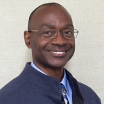
Introducing Lee Davis
Training and Organizational Development Consultant Lee Davis joined POD in September and replaces Susan Templeton as a co-facilitator for Level 1 of the Strategic Leadership Program. We asked Lee a few questions to better understand his background, what drives him, and what he hopes to bring to his position and the UW.
Q: You served in the military for a number of years. Can you talk about your career there?
I served in the U.S. Navy for 15 years, including 12 submarine deployments, various roles on surface ships, and three years as an instructor during which I trained more than 5,000 submariners. One thing I appreciated about working on a submarine and with other submariners is that even though we had a tight line of compliance to walk, people had a tremendous amount of respect for each other and for others’ differences. In the submarine community, title and position take a backseat. There is a hierarchy and established protocol, but everyone’s life depends on everyone else’s skillset. People are truly all in it together.
As far as my time as an instructor, I facilitated training in damage control and firefighting, and to do so, I had to be trained on those duties myself. That included bandaging pipes under water in the dark and finding every emergency air-breathing station on a 420-foot-long boat while blindfolded. In the submarine community, buy-in for this kind of training was easy. Everyone is interested in how to save their own life.
Q: When it comes to adult learning and professional development training, how do you see the role of a facilitator?
As a facilitator, you encourage conversation. Sometimes it can be hard to extract information and ideas from people, but by intermingling content presented in a lecture format with opportunities for dialogue, you start to draw people out. They begin to feel comfortable, see the commonalities, and usually want to contribute.
With some people, you need a tactic of “I’m here whenever you’re ready” because not everyone is willing to open themselves up or disclose information just because we’re having a group discussion or doing a case study. One particularly rewarding experience was when I was doing some facilitation for the Youth Development Program at Everett Community College a few years ago. Our task was to prepare high school students to transition to college or enter the workforce. One participant was particularly reticent; he was so shy and unsure, his father attended most of the sessions over the eight weeks with him. I just kept at it, trying to find creative ways to engage him and draw him out without putting him on the spot or embarrassing him. My reward was a note from him thanking me for my persistence and for helping him come out of his shell.
The same holds true for professional adult learners. We, as facilitators, are imparting knowledge—we’re sharing tools, resources, information—but we’re also guides. We guide discussions, we guide individual participants along their particular learning journey, and we hopefully guide people to new ways of seeing and thinking about things.
Q: What drives you personally and professionally? What makes you tick?
There is so much wonder in the world. My mother had an extensive collection of metaphysical books, and I read Ben Sweetland’s I Will when I was seven. That started a lifelong pursuit for me, both in regard to esoteric wisdom and to investigating the question of why we are here—what is our purpose as human beings? I think in many ways we live in darkness and it takes a tremendous amount of inquiry and self-exploration to even start to understand how vast we really are.
I also just love knowledge. That started for me young as well. I was an extremely shy child who found that I could more easily talk to people and make friends through helping other students with their homework. Consequently I paid attention in class and studied hard in every subject, and that gave me a starting point with people. In some ways, that’s continued until today. In the classroom, it’s through sharing knowledge—both ways—that I feel most comfortable and can best engage with others.
Q: Beyond SLP, what do you hope to bring to your role here at the UW?
Whether as a mentor, coach, or facilitator, my areas of focus include intrapersonal development, decision-making strategies for both leaders and teams, strengthening work relationships, and truly anything that helps others gain the knowledge and skills to realize their full potential. In addition, I’m keenly interested in helping new front-line leaders make the shift from peer to supervisor and fostering their development and efficacy as leaders.


